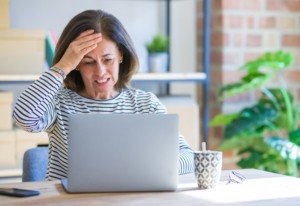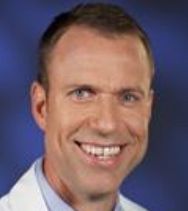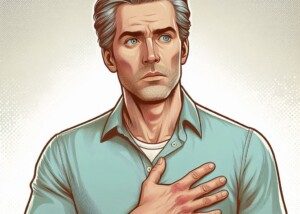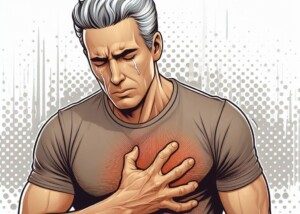
Have you noticed that soon after you sit down to do computer work, your heart starts thumping, maybe skipping beats, palpitations?
This means an abnormal heart rhythm disorder is often your first thought.
And if that’s not your first thought, maybe it’s that you’re going to have a heart attack—if not immediately, then in the very near future.
The fact that you have these palpitations or a perception of skipped beats soon after you sit at the computer points to an anxiety cause.
Heart Palpitations During Computer Work: the Explanations
Your computer work is stressful or produces anxiety. For example, you’re logging onto your credit card account to see how much you’re in debt and are worried you won’t be able to afford the minimum payment.
Or, you’ve recently had palpitations at the computer, and now, any time you sit at the computer becomes a conditioned stimulus for palpitations.
You worry about them and expect them so much that they actually occur.
Sitting before the computer may be a time of anxiety for you. Maybe it’s the stress of having to go through a ream of e-mails.
Maybe it’s what you expect the content of the e-mails to be.
Maybe you keep expecting an e-mail from an important person and it still hasn’t arrived.
Some people have admitted getting stressed reading about breaking news.

Shutterstock/Aaron Amat
All this stress and anxiety can indirectly cause heart palpitations or the sensation of skipped beats or thumping.
“I know of no direct reason computer work may cause palpitations,” says Glenn Meininger, MD, Director of Cardiac Electrophysiology Services for the Baltimore region of the MedStar Heart & Vascular Institute.
There is nothing inherent about sitting down, or viewing a computer screen, that causes a rhythm disorder in the heart.
Dr. Meininger explains, “But some thoughts are that people are more aware of palpitations when they are more sedentary, for example in bed, sitting quietly, and this may be why people are more observant or aware of abnormal rhythms.
“Also, the heart rate is slower at rest, which may allow more of an opportunity for extra/skipped beats to be present.”
What to Do About Computer Heart Palpitations
Whether it happens during screen-viewing time, reading or eating, the cause most likely is anxiety.
What you need to do is meticulously document when these incidents occur.
• What were you thinking or anticipating in the seconds prior?
• What was your body doing? Sitting? Running up a staircase? Jogging? Loading something heavy into your car? Eating?
• Is there a pattern, a common denominator?
Again, a leading cause of a thumping, fluttering or “skipped” heartbeat — commonly called palpitations — is anxiety or stress.
More Triggers
• Dehydration
• Low potassium
• Low blood sugar [glucose]
• Too much caffeine or alcohol
• Nicotine
• Exercise
• Standing up
• Swallowing
• Fever
• Prior heart attack
• Mitral valve prolapse
• Anemia [low red blood cell count]
• Overactive thyroid
• Pregnancy
• Menopause
• Heartburn (acid reflux)
• Drugs like diet pills, cold remedies, antibiotics
• Supplements like ginseng and valerian
If you’re having palpitations only while at the computer, many of these causes can be ruled out.
• And do you often sit at the computer right after having caffeine (tea, coffee, chocolate)?
• Are you often dehydrated while at the computer?
• Do you smoke or drink while at the computer?
Atrial fibrillation and supraventricular tachycardia are also listed as possible causes.
Additional Questions to Ask Yourself
• Check your pulse at the time of the skipped beat or palpitation.
Is it slow, fast? Seem funny?
• At the time of the palpitations, do you have other symptoms like dizziness, a faint feeling or chest pain?
• And of course, what are you doing when they occur?
Find that pattern, if one exists.
See if keeping dehydrated, cutting back on caffeine, quitting smoking and drinking, keeping well-nourished and managing your stress when at the computer don’t resolve the problem.
If you’re unable to trace your heart palpitations or skipped beats to anxiety at the computer, and they seem to occur randomly, then don’t hesitate to see a cardiologist.










































